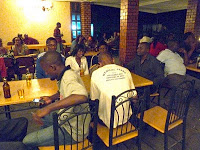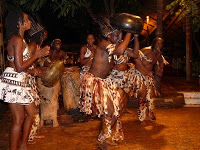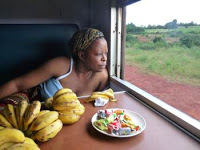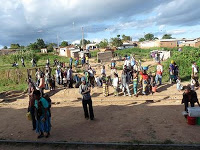A little while ago, someone proudly showed me around their hotel while telling me all about how they wanted to provide ‘the authentic travel experience’ for their guests. It was the ‘old English tea shoppe’, lederhosen and yodelling version of authenticity – great fun but about as authentic as – well – Disney. It started me thinking about what is an authentic travel experience. In Britain, I decided, it would start with a typical day’s commuting on the Victoria Line in London at rush hour and probably involve the traditional Sunday morning traffic jam outside Ikea in Croydon, followed by a pub carvery lunch with an overcooked roast and slightly soggy sprouts.
In Africa, where everyone spends a fortune on hardwood timber and thatch, Masaai spears and and zebra skins to get the ‘authentic’ African feel for their luxury lodge, I ended up having something very close to a truly authentic African experience in Lusaka last week. I was staying at the Kalahari Lodge, a jolly cross between a guest house and an upmarket bar in the shadow of a giant telecoms mast. Friday night came around and so did the live band – a key board, steel drummer and electric guitar plus a couple of singers who proceeded to play golden oldies, Radio 2 style, Summertime jazz-style, while the ‘more mature crowd’ (the words of James and Chris, two local lads who turned out to be accountants who invited me to sit with them) munched on chicken, chips and coleslaw and downed bottles of Fanta and Castle lager. Mr Karaoke in the corner crooned to himself, a gaggle of girls in too much make-up screeched their approval as the first of them got up to dance. It was an African version of Colchester town centre on a Saturday night. I am sure that somewhere else in Lusaka, there are headbangers, but meantime, this sea of imported music, drinks, and food blended into a totally genuine Zambian evening.
Last night, across the border in Zimbabwe, I had dinner at The Boma – an unashamedly touristy African showcase at the Victoria Falls Safari Lodge. I dined on crocodile, ostrich, warthog and buffalo. I had a lesson in drumming, listened to Zimbabwean music and watched traditional dancing, had my face painted and heard a folk tale about a hippo. There was even a fortune teller dressed in skins and feathers ready to cast the bones for me. Every bit of it is based on tradition, but so tarted up for the tourists it is a world away from the everyday life of normal Zimbabweans – particularly these days. Did it feel strange? Yes. But it was a very good evening’s entertainment and my money was helping to supporting a lot of local people.
Truthfully, most tourists would enjoy it far more than the beer and goat night in Lusaka. Perhaps it’s time for us to accept that jeans, burgers and bad karaoke are part of the authentic travel experience and to stop being coy about the modern world. Perhaps it’s also time to accept that there’s nothing wrong with the fantasy version created by the tourist trade – as long we recognise that that is what it is and that the proceeds go to the right people.





Recent Comments